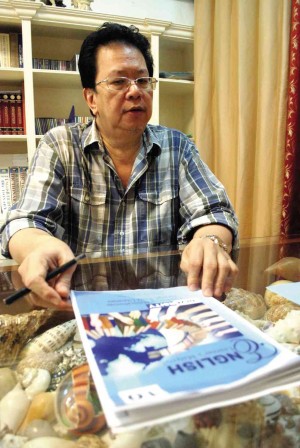Crusader says draft book still anomalous
It may be a work in progress, but it is still “anomalous.”
This was the contention of Antonio Calipjo Go on Monday, following Education Secretary Armin Luistro’s defense that the Grade 10 English textbook, titled “Diversity: Celebrating Multiculturism (sic) through World Literature,” which the self-styled “sick books crusader” had reviewed and found to have 1,300 errors, was the material’s first draft.
A digitized version of the textbook uploaded to the Department of Education (DepEd) online portal Learning Resource and Management Development System already carried a new title, “Celebrating Diversity through World Literature.”
Go said he got copies of the learner’s material from two public school teachers who attended DepEd’s May 15 National Training on Trainers.
The academic supervisor of Marian School of Quezon City, however, declined to identify from what schools the teachers came from.
“It’s all the more anomalous. Why are they allowing the first draft to be used during the training? Shouldn’t the teachers use the most correct [version of the textbook]? That’s just an excuse,” Go told the Inquirer.
He added that the teachers gave him the textbook because “they could see that there are many errors.”
Only recourse
Asked why the teachers preferred to point out to him the errors rather than to the DepEd, Go said the teachers “aren’t allowed to go against [DepEd]. Their only recourse is to come to me.”
In a Facebook post, Education Undersecretary Dina Ocampo said on Monday that most of the textbook’s errors had been found and addressed by the DepEd before it was sent to the printer.

ERROR-FILLED Antonio Calipjo Go, academic supervisor at Marian School, shows the “sick” Grade 10 draft textbook. ARNOLD ALMACEN
“That version was used for training only. There have been three or four versions since that. Improvements were done with the help of fellow teachers who shared their time and expertise with DepEd generously and quietly,” Ocampo said.
The Inquirer has learned that the May 15 event was a two-pronged seminar—teachers were given copies of the textbook not only to train them on the subject but also to engage them in the process of making the textbook better, by spotting errors in it.
Assistant Education Secretary Jesus Mateo on Monday explained to Radyo Inquirer dzIQ that before a textbook landed on a student’s desk, it was first screened by an expert on the subject who would then send the material back to DepEd for review. After the DepEd reviews it, the material is then sent to an institution expert on a specific subject, like the University of the Philippines National Institute for Science and Mathematics Education Development (UP Nismed).
UP Nismed is familiar with Go’s work, having been criticized in 2010 for the “Biology” book it developed. On its page, the institution criticized Go for spending “his time trying to demolish rather than create.”
Patronizing a heretic
“Difference in preferences should not give rise to the heresy that Mr. Go is always right and those who disagree with him are always wrong,” it said in its online newsletter.
Mateo said the DepEd was saddened by the actions of Go, whom they hoped had told the DepEd “what he noticed so that in that way he was able to help us [correct the errors].” He added that the department has reached out to Go several times asking him “if he could help as a reviewer.”
“The DepEd is open to listen to the comments of the [various] stakeholders. We value the feedback because that’s the only way we can improve the system,” he said.
Go confirmed that DepEd officials had asked him verbally at least three times over the last few years to join its reviewing process. He, however, said he declined.
“I don’t want to be part of the system. Otherwise I’ll lose my independence. I won’t be able to write the way I do,” he said.
Go was referring to the textbook screening body Instructional Materials Council Secretariat (IMCS), which he said should be an independent body outside the DepEd.
“If you’re the IMCS, would you criticize or go against your boss? Will the DepEd [be honest enough] to admit its mistakes? We need an objective, independent screening body. It shouldn’t be under the DepEd,” he said.
‘Lost in translation’
Go added: “If the DepEd will ask me to give them the correction, I will even sit down with the writers, point out the errors and suggest corrections. But by all means, the DepEd should publicly acknowledge the errors and [tell that] they’re asking for my help to correct [the textbooks].”
In publicly acknowledging the errors, Go said the DepEd “will be compelled to correct” the errors.
“Otherwise what happens is that they will ask for the correction and that’s about it. They have the option not to implement the correction,” he said.
Go dismissed claims by his critics that he had a personal motive for releasing the errors first to the media.
“I have no intention of going into politics or getting a seat in DepEd. I didn’t dream of that. This is my advocacy: to rid textbooks of errors,” he said.
A college dropout, Go has spent his own money buying newspaper advertising space to point out DepEd book errors.
In pursuing his advocacy to get rid of public school books “lost in translation,” he has earned lawsuits and media brickbats from publishers and authors, many of them with a string of PhDs to their names.
In a press statement on Monday, the DepEd pointed out that developing the learning materials and teaching guides “involves several stages of drafting, editing and validation, as well as various consultations with content writers, reviewers and editors before printing.”
It added that the department was open to receive feedback through their e-mail action@deped.gov.ph and would “appreciate constructive engagement that would lead to the attainment of quality learning materials.”
RELATED STORIES
Crusader finds 1,300 errors in Grade 10 book


















